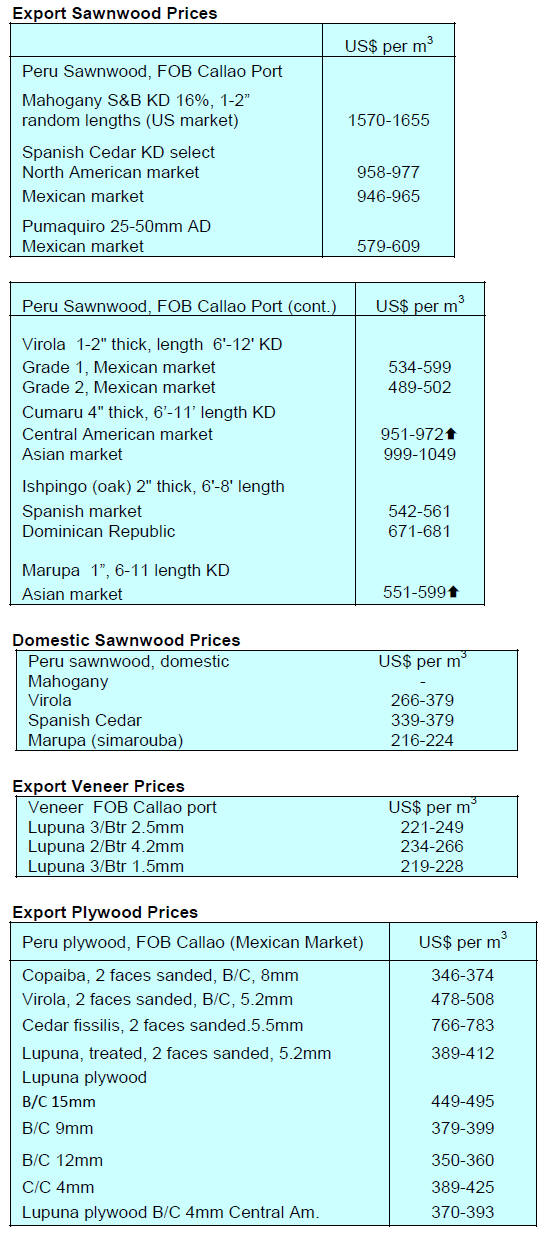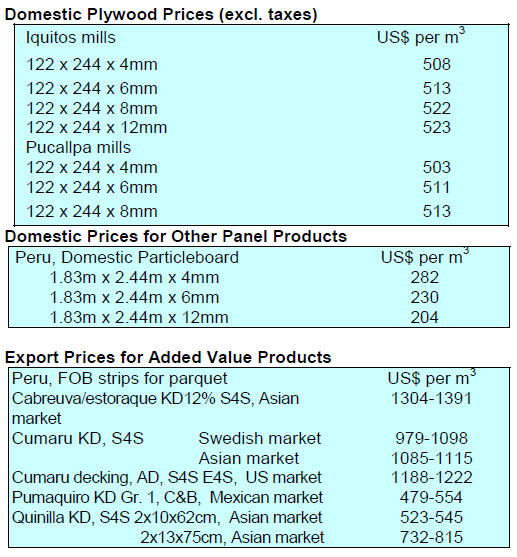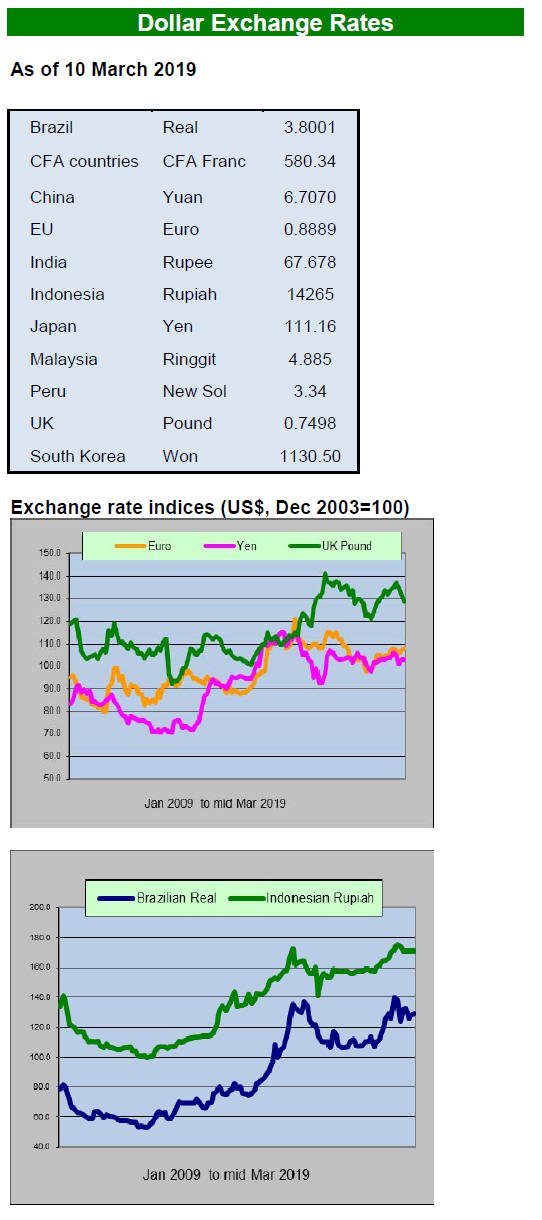3.
MALAYSIA
MIFF Malaysia - 600
exhibitors from 14 countries
The 2019 MIFF (Malaysian International Furniture Fair)
marked the 25th time the show has been arranged
cementing its position as major business to business hub
for suppliers and manufacturers in South-East Asia.
According to fair organiser, UBM Malaysia, international
buyer participation was up around 10% from the previous
fair with a strong showing from North
America, Africa and Eastern Europe.
MIFF 2019 was the first UBM Malaysia event to host a
pavilion for the group's corporate social responsibility
initiative ‘Kind Malaysia’ to match businesses with
projects undertaken by humanitarian non-governmental
organisations.
The organisers report that there were 600 exhibitors from
14 countries including China, Indonesia, South Korea, the
United States, Turkey, Portugal, New Zealand and
Romania.
In April last year Muar, a historical town and the capital of
Muar District, Johor State, was named the Furniture City
of Malaysia. Despite its small size Muar is an furniture
industry giant accounting for 70% of Malaysia's furniture
exports. In MIFF 2019 200 companies from Muar
exhibited largely due to the close association between the
MIFF organisers and the Muar Furniture Association.
In related news, the Malaysian Timber Council has a press
release announcing the Malaysian Wood Expo 2019,
jointly organised by the Malaysian Timber Council and
Panels & Furniture Asia to be held 19 – 21 November
2019 in Kuala Lumpur.
MTC in its press release says “The Malaysian Wood Expo
2019 (MWE 2019) is a show that is not-to-be-missed!
Jointly organised by the Malaysian Timber Council
(MTC) and the publisher of wood magazines, Panels &
Furniture Group, MWE 2019 will be the first true coming
together of top exhibitors in this part of the world.
Some of the finest international wood-based
manufacturers and exporters as well as woodworking
machinery suppliers and buyers are expected at the
expo. MWE 2019 is also an avenue to tap into the
unlimited opportunities that some of the fastest-growing
Southeast Asian economies have got to offer.”
Sarawak plantation development
The decision by the Sarawak government to sign a
memorandum of understanding (MoU) with Edge Global
Norway As. has caught everyone’s attention and attracted
media attention.
Under the terms of the MoU, the parties will undertake
ecosystem mapping, baseline emission studies, carbon
stock assessments and soil condition analysis in order to
determine the optimum methodologies for the restoration,
conservation or enhancement of project areas.
Plywood prices
Traders based in Sarawak reported the following export
prices:
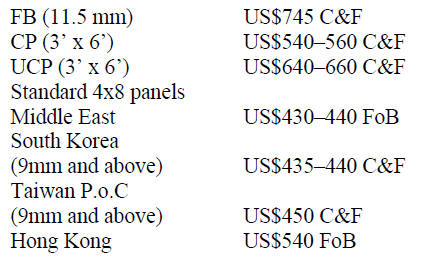
4.
INDONESIA
Eliminating illegal logging
in Maluku and Papua
Director General of Law Enforcement in the Ministry of
Environment and Forestry (KLHK), Rasio Ridho Sani, has
said the ministry is strongly committed to eliminate illegal
logging that continues in Indonesia. He particularly
mentioned that efforts are underway to eliminate illegal
logging activities in Maluku and Papua taking advantage
of high-tech monitoring and committed human resource
capacity.
President demands legal protection for forest
communities
The Indonesian President has reminded his administration
that the government has a clear policy on land use in forest
areas that calls for providing legal protection for
communities that depend on using land in forest areas.
The President urged ministers to speed up data collection,
inventories and verification of land use in forest areas. He
emphasised that a simple, easy to understand, system to
record and protect land use in forest areas is required.
Strengthened cooperation in SFM
The Research and Development Agency of the Ministry of
Environment and Forestry (BLI KLHK) and the Center for
International Forestry Research (CIFOR) have agreed a
new phase of cooperation and this was confirmed through
a memorandum of understanding (MOU). This MOU
extends the joint work on the development of Indonesia's
national carbon accounting system, smoke-free sustainable
livelihood projects, sustainable wetland adaptation and
mitigation programmes and improving governance,
policies and institutional arrangements for REDD and
global comparative studies on REDD +.
Private sector utilises output from social forestry
groups
Bambang Supriyanto, Director General of Social Forestry
and Environmental Partnership (PSKL) of the Ministry of
Environment and Forestry, said that much of the output
from social forestry is being absorbed by various
companies.
The State-owned enterprises that utilise social forestry
production are Perhutani, Bulog (Logistic Agency),
Perindo (Indonesian Fisheries) and RNI (Rajawali
Nusantara Indonesia). In addition several private
companies were mentioned including PT GarudaFood,
Carrefour, Nestle and IDH Sustainable Trade Initiative.
Younger generation understand benefits from green
purchasing
FSC Marketing and Communication Manager, Indra Setia
Dewi, has said that the younger generation, especially
millennials, are more conscious of what they buy or use as
they understand purchasing behaviour can contribute to
environmental sustainability. However, she said more
needs to be done to raise people’s awareness of
sustainability issues and as a start the recognition of
certified sustainable product labelling needs further
promotion.
Wood products have clear export potential
Based on studies conducted by the University Network for
Indonesian Export Development (UNIED) on the main
export commodities it is processed cocoa and wood
products that have the greatest export potential. This,
according to the authors of the study, is due to their high
competitiveness and large market potential.
Wood products are considered one of Indonesia's leading
exports and these products perform well in Asian markets.
UNIED noted that Indonesia has strong competitive
position with wood charcoal, unprocessed wood and
plywood.
UNIED says Indonesia's timber and furniture exports are
forecast to grow in 2019 with exports (especially
plywood) to Japan being one of the drivers. Exports of
wood and processed wood products are expected to grow
12% in 2019 and exports of wood furniture are projected
to grow by around 10% this year.
In related news and in contrast to the forecasts made by
UNIED, the Secretary General of the Association of
Indonesian Furniture and Handicraft Industry (HIMKI),
Abdul Sobur, said that 2019 furniture exports are
estimated to only grow 5-6% year-on-year as there are
many obstacles, one of which is the Timber Verification
and Legality System (SVLK) which is applied to
downstream products. This, said Sobur, makes it difficult
for exporters to be competitive in international markets.
He claimed, overseas buyers do not ask for SVLK
documents for downstream products such as furniture.
According to him documentation is only requested for
wood raw material. Sobur estimated that if the SVLK
requirements for downstream products were removed
furniture exports would rise.
Wood product exports to Australia to rise due to EPA
The Indonesian manufacturing industry will have a greater
opportunities to increase exports to Australia following the
signing of Indonesia-Australia Comprehensive Economic
Partnership Agreement (EPA) according to the Minister of
Industry, Airlangga Hartarto.
Indonesian Trade Minister Enggartiasto Lukita and
Australian Minister of Trade, Tourism and Investment,
Simon Birmingham, signed the agreement in the presence
of Indonesian Vice President, Jusuf Kalla. Indonesia`s
exports to Australia will likely increase as Australia has
committed to eliminate import duties. Among the
Indonesian products whose exports could rise are wooden
furniture.
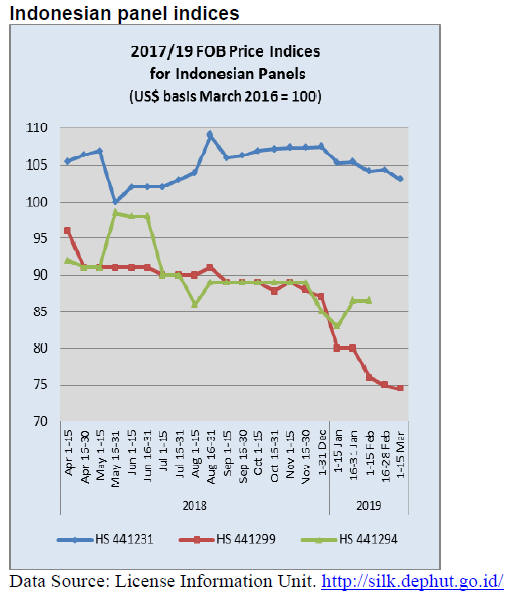
5.
MYANMAR
Cooperative efforts to
eliminate illegal logging
In early March a workshop approved by the Republic of
the Union of Myanmar Ministry of Foreign Affairs and
supported by the Natural Resources Division of the US
Department of Justice was held in Myanmar aimed at
strengthening government efforts on combating illegal
timber harvesting and subsequent trade in illegal products.
It is understood that representatives from the US
Department of Homeland Security, Immigration and
Customs Enforcement, the US Fish and Wildlife Service,
INTERPOL and the UN Office of Drugs and Crime
participated along with representatives from domestic law
enforcement agencies such as the Forest Department,
Myanmar Police Force, Custom Department and Attorney
Generals Department as well as NGOs, CSOs and
academics.
A representative from the Myanmar Forest Certification
Committee explained the latest developments in
establishing and operating the Myanmar Timber Legality
Assurance System. According to participants the
impression gained was that the US administration is
debating the possibility of creating a mechanism similar to
the EU timber regulation to complement the Lacey Act
since the basis of the EUTR and Lacey Act is different.
Efforts by the government to eliminate illegal logging
continue. Between October 2018 and January 2019 5,112
tons of illegal timber (including 2,842 tons of teak was
seized.
See: http://www.myanmarforestcertification.org/u-s-governmentsponsored-
workshop-to-combat-timber-trafficking-in-yangonmyanmar/?
doing_wp_cron=1552523881.7496030330657958984
375
Myanmar Multi-Stake Holder Group continues work on
VPA preparations
Although the UK Department for International
Development (DFID) has suspended funding for VPA
negotiations, the Myanmar Multi-Stake Holder Group is
continuing activities although the lack of UK support has
slowed the momentum of discussions. There is no clear
indication from either side how the VPA negotiations can
be restarted.
Peace Park – protecting ethnic community rights
In December 2018, indigenous Karen communities, the
Salween Peace Park Committee, and the Karen
Environmental and Social Action Network (KESAN)
officially launched the Salween Peace Park in the Mutraw
District of Myanmar’s Kayin State. The Salween Peace
Park encompasses 5,485 square kilometers of the Salween
River Basin including more than 340 villages, 139
demarcated Kaw, 27 community forests, four forest
reserves and three wildlife sanctuaries.
https://frontiermyanmar.net/en/salween-peace-park-federalismfrom-
below
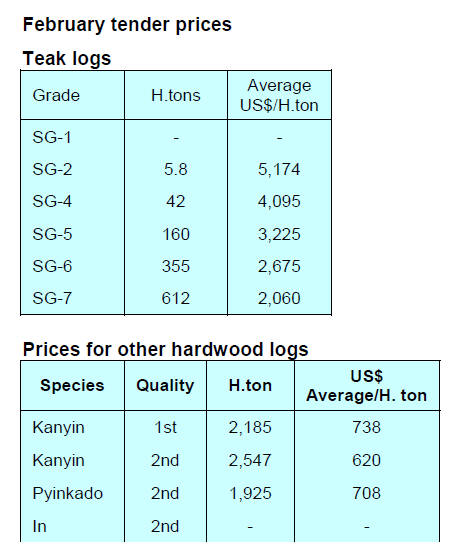
6. INDIA
Panel product price index dips slightly
India’s official wholesale price index for all commodities
(Base: 2011-12=100) for January 2019, released by the
Office of the Economic Adviser to the government, fell to
119.2 from 120.1 for the previous month.
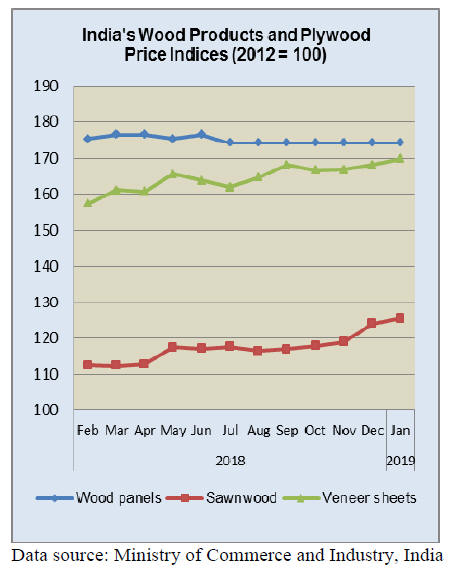
The index for manufactured wood and cork products
fell
slightly mainly due to lower prices of plywood veneers
and other panels. However, prices for sawnwood and
blockboard inched higher in January.
The annual rate of inflation based on monthly WPI in
January 2019 stood at 2.76% compared to 3.84% for
December 2018.
The press release from the Ministry of Commerce and Industry
can be found at:
http://eaindustry.nic.in/cmonthly.pdf
No more GSP in US for Indian furniture exporters
The US has said it intends to end India’s GSP
(Generalized System of Preferences) facility. The GSP is
one of the oldest trade preference initiatives aimed at
promoting economic growth in developing countries
through duty-free entry for designated exports.
This move by the US would impact India’s export
competitiveness for a range of products including
furniture.
Commenting on the US move the President of the
Federation of Indian Export Organisations pointed out
that, currently, Indian exporters enjoy tariff preference on
about a third of the full range of products and that the
tariff advantage averages around 4%.
For more see:
//economictimes.indiatimes.com/articleshow/68298617.cms?utm
_source=contentofinterest&utm_medium=text&utm_campaign=
cppst
Plantation teak prices
The steady US dollar/rupee exchange rate is a blessing for
importers and analysts report that trade circles are
suggesting that the rupee may be strengthening which
would be an added bonus.
Import volumes of plantation teak continue on a regular
basis and despite some weakness in the construction sector
this has not led importers to reduce the volumes they are
bringing into the country, if anything there has been an
improvement in shipments from South American and
African sources.
C&F prices for plantation teak landed at Indian ports are
within the same range as shown in the previous report.
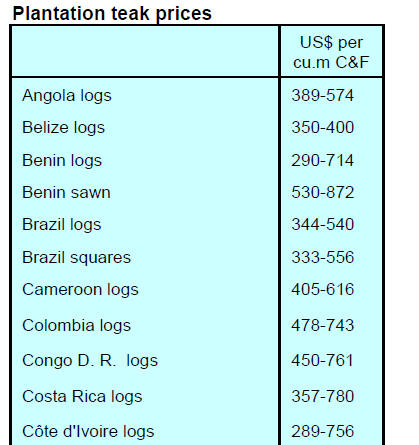
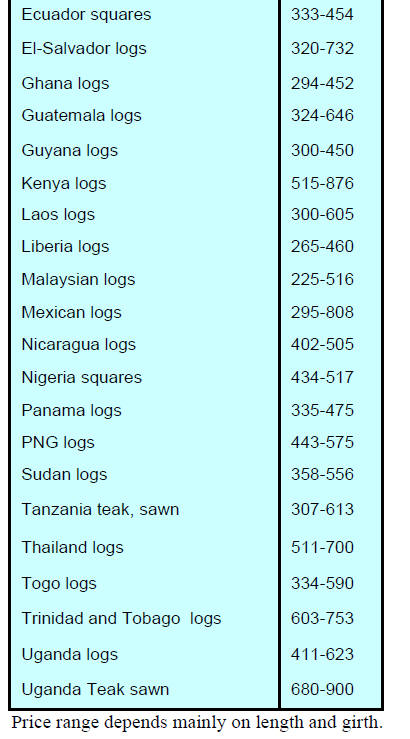
Locally sawn hardwood prices
Prices for imported sawn hardwoods remain unchanged.
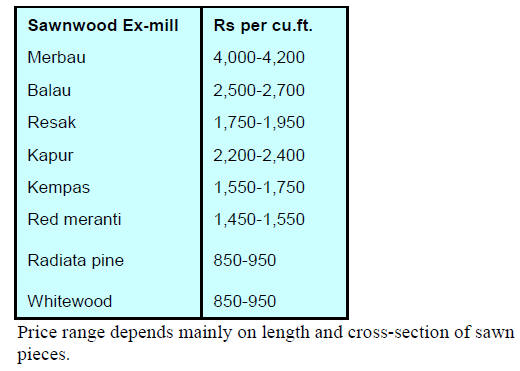
Myanmar teak prices
Analysts report that traders are frustrated that they cannot
secure as much Myanmar teak as before. Delayed
shipments and bureaucratic obstacles appear to be the
main issues in Myanmar.
Prices for Myanmar teak continue as previously reported.
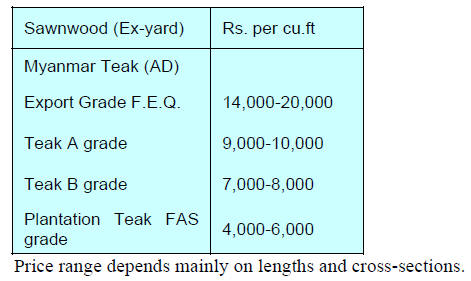
Sawn hardwood prices
Sawn temperate hardwoods are gaining acceptance in
India and efforts by exporters to provide information on
available species and recommended end-uses are helping.
Some countries have opened advisory offices in India
which has helped simulate demand. Indicative prices for
some imported timbers are shown below.
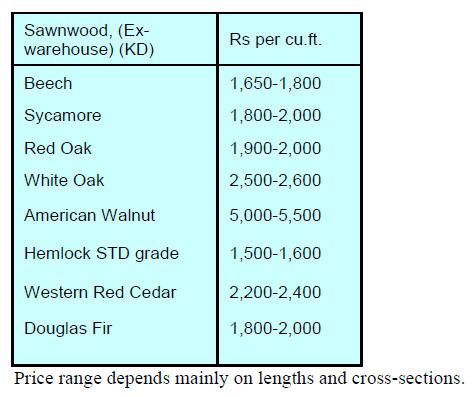
Plywood
Appeals by plywood manufacturers and traders for a
reduction in the GST (Goods and Services Tax) from 18%
to 5% continue. The GST tariff plywood and laminates
was revised down from 28% to 18% last November but
manufacturers complain the 18% GST is too high. Current
Ex-warehouse prices for domestically made plywood are
illustrated below.
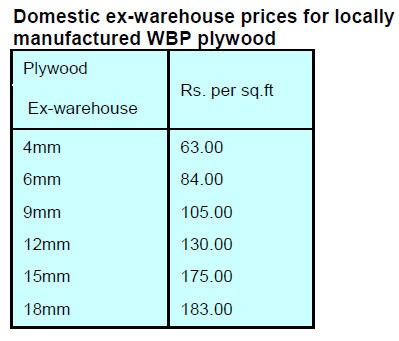
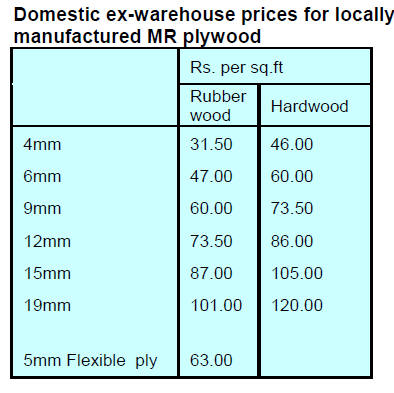
7. BRAZIL
Plantation target achieved early in Mato
Grosso - how
to utilise it all?
At the end of 2018 it has been determined that Mato
Grosso do Sul State had 1.1 million hectares of planted
forests. This already surpassed the 2030 1 million ha.
target.
However, according to the Planted Forest Producers and
Consumers Association of Mato Grosso do Sul State
(Reflore-MS), consumption of plantation timber was
around 20 million cubic metres, 30% lower than targeted.
With a looming surplus, discussions have been held on
installation of a third pulp mill in the State; along with the
creation of a sawnwood promotion centre in the Água
Clara region as well as expanding the use of wood in
energy projects.
Domestic furniture sales rising
The Brazilian Furniture Industry Association
(ABIMÓVEL) recently provided data on the Brazilian
furniture market and the furniture industry in Rio Grande
do Sul, one of the main furniture producing states in
Brazil.
ABIMÓVEL says retail furniture sales increased 7.3% in
December 2018 over the previous month and the average
price of furniture was R$209.49 per piece. In January
2019, the average price rose slightly to R$209.74 a
welcome sign of improving demand.
The Brazilian furniture industry produced 33.5 million
pieces in December, a decline of 20% compared to
November.
Furniture imports in December dropped to US$14.5
million, a 23% decline compared to November. However,
in January 2019 imports reached US$19.4 million, an
expressive growth of 34%.
2018 a record year for the planted forest sector
According to the Brazilian Tree Industry (Ibá) 2018 was a
record year for the planted forest sector in Brazil and the
trade balance advanced 28% due to an increase in exports
of pulp, woodbased panels and paper.
The sector exported US$10.7 billion, an increase of 26%
compared to 2017. There was a rise in exports of pulp
(32%), wood panels (7%) and paper (8%).
The main buyer of Brazilian pulp in 2018 was China
which imported US$3.5 billion, up 38% year on year.
Paper sector exports to mainly Latin American expanded
13% year on year in 2018. Woodbased panel exports rose
4% in 2018, with some 1.3 million cubic metres being
exported.
The main market for woodbased panels in 2018 was
Europe which saw a rise of 160% year on year. However
exports to markets in Asia and Oceania declined in 2018.
Sales in the Brazilian domestic market expanded around
3% in 2018 compared to 2017.
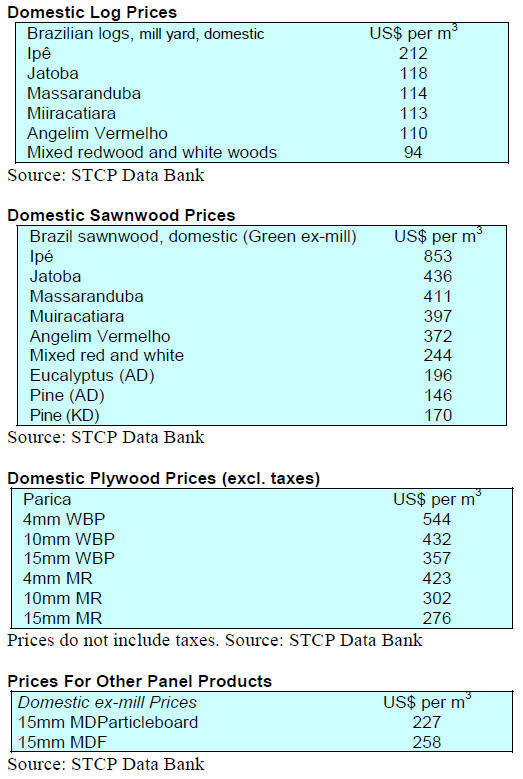
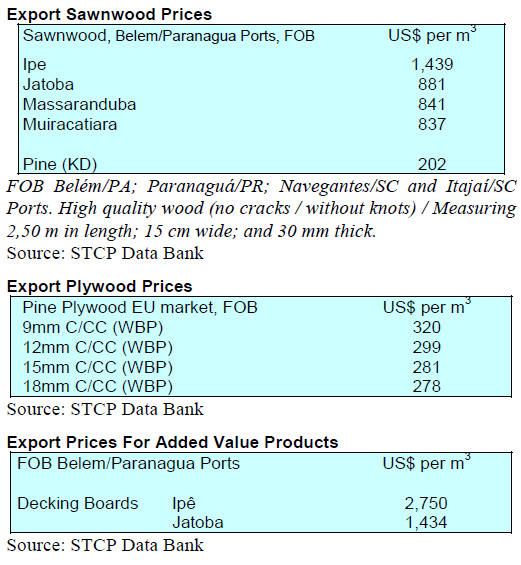
8. PERU
Peruvian exports of wood grew during 2018
The Association of Exporters (ADEX) has reported that
2018 exports of Peruvian wood products were valued at
US$124.6 million FOB compared to the 2017 value of
wood products which was US$110.8 million.
Of the US$124.6 million exported in 2018, China
continued to be the main market with a 32% share but this
was lower than in 2017. The United States market was the
second most important market accounting for an 11%
share of exports in 2018 some 17% higher than in 2017.
Mexico was the third most important market with a 10%
share of exports but here the value of exports in 2018 was
26% less than in 2017.
US$3.3 million in business from Domotex 2019
The Commission for the Promotion of Exports and
Tourism (PromPerú) has reported that Peruvian timber
companies attracted business worth over US$3 million
during Domotex 2019, a major trade show in Germany
dedicated to floor coverings.
Exporters from Lima and Madre de Dios and the Ucayali
Export Consortium (CEMU Ucayali) attended the fair and
their participation was organised by PROMPERÚ and the
Commercial Trade Office of Peru in Hamburg (OCEX).
Most participating companies are FSC certified.
Proposal to extend benefits for agro-industry to
forestry
The Minister of Production has indicated that the
government is working on a regulatory proposal to extend
the tax and other benefits provided to the agro-sector to
cover the entire forestry sector.
On the same subject, Erick Fischer, Second Vice President
of ADEX said that the forestry sector would benefit from
the same benefits as the agro-forestry sector and that this
would boost output and exports.
